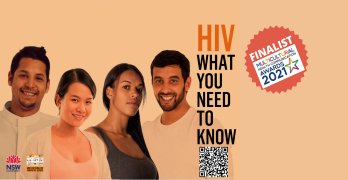This HIV Testing Week (1-7 June) is urging people, including those from diverse backgrounds to resume routine HIV testing.
Early diagnoses helps people get effective treatments in time and reduce the risks of passing on HIV to others.
Data released by NSW Health shows HIV testing rates dropped in 2021 due to COVID-19 disruptions. Laboratories tests in NSW were 15% lower in 2021 than in 2019. Home testing via Dried Blood Spot (DBS) dropped by 50% in the last quarter of 2021 than in the previous quarter.
There are many options to get a HIV test. HIV testing is free if you have a Medicare card. Temporary visitors in NSW without a Medicare card may go to Sexual Health Clinics for free, easy and confidential services. For people wanting to avoid crowded places such doctor’s offices and clinics, the online DBS test remain a popular option.
DBS testing kit is available for order from hivtest.health.nsw.gov.au. For more information, download 2021 NSW Multicultural Health Communication Award-winning resource HIV – What you need to know for more information here.




